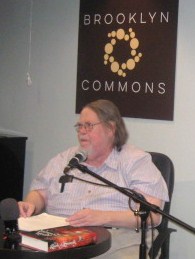Gardner Dozois died May 27, and Michael Swanwick’s “The Gardner Dozois You Didn’t Know You Knew” (linked yesterday) has gone viral in the sf community.
Many other friends, colleagues and admirers of Dozois are also mourning the famed sff editor and writer. Here are a few excerpts:
Pat Cadigan on Facebook.
You will read a whole lot of tributes to Gardner, lauding him as a person, an editor, and a writer, and even the most superlative won’t be superlative enough.
But Gardner Dozois and Susan Casper were more than that to me…they were family.
I’m not trying to claim I’m part of Gardner’s and Susan’s family. I’m saying they’re part of mine.
But, as Michael Swanwick has pointed out to me, we don’t get the people we love for free. The pain of losing them is the price we pay for the privilege of having them in our lives.
They’re worth it.
Walter Jon Williams: “The Passing of a Titan”.
In public, Gardner was a Personality. Loud, lewd, and Rabelaisian, he was an effervescent source of fun and mischief. I remember chatting with him in a crowded restaurant when the room suddenly went quiet, in one of those odd silences that can sometimes occur even in a busy room. Gardner was the only person in the room who kept talking, and suddenly the entire room heard Gardner’s high tenor voice singing out the words “FEMALE . . . GENITAL . . . MUTILATION.”
The silence went on for some time after that.
But if he were only the large-scale public personality, he wouldn’t have had the impact on the field that he did, and he wouldn’t have found and published the literate, sensitive stories for which his tenure at Asimov’s became known. He wouldn’t have won the Hugo Award so many times, and there wouldn’t be so many very good authors who owe him a boost in their careers.
David Gerrold on Facebook:
Over the years, he established himself as one of the people who simply defined what science fiction could be — as a writer, an editor, and a reviewer. It was my privilege to present the Skylark award to him at a Boskone a few years ago — but because of his health issues, he wasn’t able to accept the trophy in person. I think I was as honored to present it to him as he was to receive it.
To put it simply, Gardner was one of the people whose respect I wanted to be worthy of. He edited the Year’s Best SF anthology for over three decades. But it wasn’t until number 23 (if I remember correctly) that he finally decided one of my stories should be included. (And then one more time, a couple years ago.) To make it into one of his anthologies had been on my bucket list. I am heartbroken that there will be no more Year’s Best with his name as editor.
Equally saddening, losing him as a reviewer. Gardner had an insightful eye — which is why I always turned to his reviews first in nearly every new issue of Locus. I think that’s one of the things I will miss the most — there will be no more reviews of short fiction by Gardner and Locus will be just a little less fun to read.
Alastair Reynolds, after recounting Dozois’ influence on his career, ends his “Gardner Dozois” tribute —
I can’t say I knew him terrible well; we met on perhaps two of three occasions over the years during which he (and his late wife) were charming company, but I liked him very much and his passing will leave a considerable void in the SF community. I always let him know how much it meant to me that he picked up my stories, and I hope some of that got through to him – it really was sincerely meant. And – all too briefly – I ought to mention that he was also a fine and stylish writer, a very accomplished SF thinker who could easily have had a career just as a writer, but who directed most of his energies into editing instead, and thereby did the community a great favour. He was also a very readable diarist, and – although it’s been many years since I last encountered them – his travel writings were extremely enjoyable. He was a loud, colourful presence at SF conventions, but also a sensitive, cultured and knowledgeable man in private.
Lorena Haldeman on Facebook.
Some days you wake up and the daylight seems a little dimmer, your gravitational spin seems a little off; as if a star has gone out and the universe has to learn to adjust to new patterns.
I’ve always truly believed that the best way to keep people with us, in our hearts, when they have to leave the party, is to look for the qualities we so deeply admired in them and cultivate those in ourselves. May a part of me, going forward, always find mad humor in the angry darkness, keep the ability to be gentle in the tossing storm of life, and to be able to find the heart of the story by expertly cutting out the unnecessary.
Matthew Cheney shares bittersweet memories of growing up with Asimov’s – and growing apart, in “Gardner Dozois (1947-2018)”.
Dozois never showed interest in avant-garde fiction, at least to my knowledge, but in his early years at Asimov’s and in the late-’80s/early-’90s Year’s Bests he published quite a bit of work that pushed against various borders and walls, especially the expectations of genre readers about what SF could and, indeed, should be. His was a pluralistic, ecumenical, eclectic vision of the field, one gained from coming up as a writer himself in the years after the New Wave had shaken things up a bit. He loved a good space opera, but he was just as much a champion of “The Faithful Companion at Forty”, the sort of story that less open-minded readers said didn’t belong in a science fiction magazine.
Lavie Tidhar will miss him in a very practical way: “RIP Gardner Dozois (1947-2018)”.
What I can say about Gardner is that he meant a hell of a lot to me. He was my most strident champion in short fiction. He first contacted me about ten years ago, asking to reprint one of my stories in his seminal Year’s Best Science Fiction anthology series. Since then, he’s included me in every volume, sometimes doing me the honour of reprinting not one but two in the same volume. I only skipped one year – I got fed up with short fiction for some reason and published barely nothing, and it was the realisation that I missed a volume in Gardner’s anthology, I think, that made me realise how ridiculous I was being, so I started again.
…He’d asked me for a new one just 3 weeks ago. I was just about to start writing it… I don’t really know what happens now. He was an amazing editor, a defining force, and my knight in shining armour. He knew my work better than I did. There is no one else like him. The world of science fiction is poorer for not having him, but God damn it, I needed you, Gardner!
Jamie Todd Rubin shares memories of one of “The Nine Billion Names of Science Fiction”.
…I was present for an amazing “panel” discussion that included Gardner, and George R. R. Martin at Capclave back in 2013. It was standing-room only, and I stood near the back for two hours, laughing harder than I’d laughed in years. Gardner told stories from his days in the army, and the refrain across the convention the following day went something like: “IF YOU DO (X) YOU WILL DIE.” You had to be there.
…I have to remind myself that Gardner himself was a supernova. He was a nursery for new stars. And while his star may have winked out, there are thousands that he helped create that still shine brightly, and will continue to do so for generations to come.
Alec Nevala-Lee was affected by “The Constant Gardner”.
Gardner and I never met, and we exchanged only a handful of emails over the last decade, but he profoundly affected my life on at least two occasions. The first was when I was twelve years old, and I received a copy of Asimov’s Science Fiction—which Gardner was editing at the time—for my birthday. As I’ve recounted here before, it was that present from my parents, given at exactly the right moment, that made me aware of short science fiction as a going concern, as embodied by its survival in the three print digests. My career ended up being more closely tied to Analog, but it was Asimov’s that set me on that path in the first place. Without that one issue, I don’t know if it would have occurred to me to write and submit short stories at all, and everything that followed would have been very different.
Lou Antonelli says “Farewell, Oh Great One!”
I will always be grateful to Gardner Dozois for encouraging me and giving me invaluable writing advice when I was just starting to write spec fic back in 2003 and 2004, and ultimately accepting my first pro sale, “A Rocket for the Republic”, which was published in Asimov’s Science Fiction in Sept. 2005.
That was the only story of mine he ever accepted, because it was the last he ever accepted before he retired in April 2004. I will always be proud of the fact that mine was the last story he bought before leaving Asimov’s after 19 years.
John Clute concludes his entry on “Dozois, Gardner” at The Encyclopedia of Science Fiction —
It may be that Dozois’s main contribution to sf – including a maturely realistic sense of the nature of the worlds he honoured both in his creative work and in his edited books – was technical: his remarkable capacity to select (and to edit) work that is both exciting to read and adult on reflection. But over and above that, his abiding contributions to the field seem from the first to have been fueled by his deep love for the field, not uncritical but unfaltering.
Richard Parks remembers hanging out on Delphi: “Gardner Dozois 1947-2018”.
I actually “met” Gardner online back in the early 1990’s, in the relatively early days of what was almost but not quite the internet. Before FB and Reddit there was Genie and Delphi, “bulletin board” sites where you logged in through an analog modem to argue and chat with friends. A lot of the sf/f field hung out on Genie, but on one night a week a smaller, very lucky group came together on the sf/f board on Delphi. Membership varied, but at one time or another there was Janet Kagan, Pat Cadigan, Lawrence Person, Jack L. Chalker, Eva Whitley, Mike Resnick, Susan Casper and yes, Gardner Dozois. And me. I wasn’t the only nobody there, of course, but on the other hand there weren’t any nobodies there. It was a friendly group and everyone felt welcome. I certainly did. At the time I had only sold one story, several years earlier, to Amazing SF, and while I was still working hard, I was beginning to think that was it. And even though talking business was generally frowned on, it was there that Gardner broke the news that he was taking a story of mine, “Laying the Stones,” for Asimov’s SF. Now imagine yourself drowning, not for a minute or two but for months, years, and somebody finally throws you a lifeline.
For me, that somebody was Gardner Dozois.


